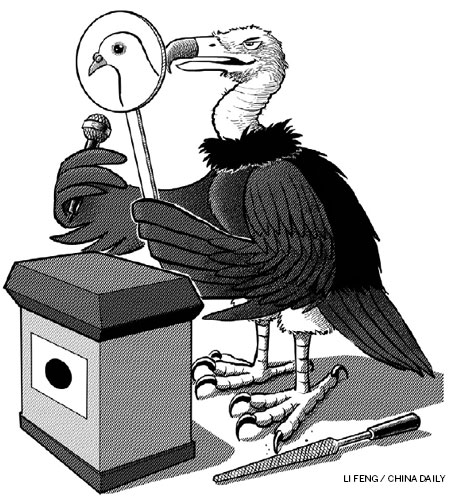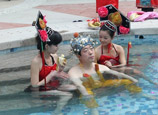
 |
| (Photo/ China Daily) |
Key Words: China-Japan; Diaoyu Islands
Related Reading:
>> Cross-Strait compatriots share responsibility of safeguarding Diaoyu Islands
>> Abe suggests Japan-China summit necessary to mend ties
>> Japan to beef up surveillance over Diaoyu Islands
Japanese Prime Minister Shinzo Abe reiterated on Feb 1 that Japan-China relations remain one of the most important bilateral relations for Japan and should be improved overall.
Before that, some Japanese public figures and senior officials of Japan's ruling party, including former Japanese prime ministers Yukio Hatoyama and Tomiichi Murayama, have visited China separately over the past weeks, raising hopes of a thaw in Sino-Japanese relations. The visit of Abe's special envoy Yamaguchi Natsuo's to Beijing has added to that hope.
But the sharp differences between the two countries cannot be resolved simply through the wishes of Japanese politicians and public figures. What Japanese politicians need to do now is to translate their wishes into concrete actions to break the deadlock of their own making.
Japan broke the agreement of "shelving disputes" to work for the future reached by former Chinese premier Zhou Enlai and former Japanese prime minister Kakuei Tanaka. Japan even accuses China of forging this agreement and refuses to acknowledge its existence.
Despite China's fierce opposition to the illegality and invalidity of Japan's unilateral actions on the Diaoyu Islands, Japan went ahead with its plan to "purchase " the islands, and tried to eliminate all obstacles to "private ownership" and ultimately "nationalization " of the islands to reinforce its control over them.
Although China has asked Japan to at least accept the existence of a dispute over the islands, Japan has firmly denied that there is one. Instead, it has overacted to China's rightful actions to defend its sovereignty.
The Abe government has drafted its road map to improve Sino-Japan relations before resolving the Diaoyu Islands dispute. Abe has indicated that China should stop making a "fuss" over the Diaoyu Islands and that Japan will adopt an even tougher policy toward them. He wants China to acknowledge or give tacit consent to Japan's policy and not to break off relations with Japan just because of the Diaoyu Islands dispute. He has also said that he believes China and Japan can deepen economic and trade cooperation despite the islands issue.
Moreover, there are enough indications that the Abe government will seek to amend Japan's constitution to upgrade the country's Self-Defense Forces to a full-fledged military and "realize its right to self-defense".
A possible amendment to Japan's constitution seems irrelevant to the Diaoyu Islands issue. But in reality it is related to peace and stability in the entire Asia-Pacific region. The Abe government will "realize Japans' self-defense rights" by altering the Defense Guideline, under which it can add new articles to the constitution. Abe has vowed to reinforce the military capability of Japan, especially in the southwestern islands, which is believed to be targeted at China.

















 The journey is more important than the destination:Three people who opted for an adventure tell stories.
The journey is more important than the destination:Three people who opted for an adventure tell stories.


![]()
